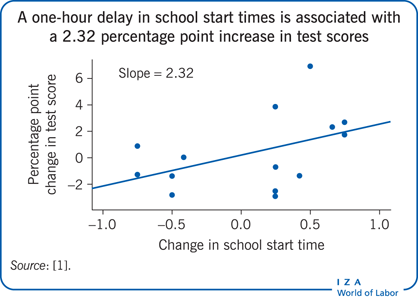Elevator pitch
The combination of changing sleep patterns in adolescence and early school start times leaves secondary school classrooms filled with sleep-deprived students. Evidence is growing that having adolescents start school later in the morning improves grades and emotional well-being, and even reduces car accidents. Opponents cite costly adjustments to bussing schedules and decreased time after school for jobs, sports, or other activities as reasons to retain the status quo. While changing school start times is not a costless policy, it is one of the easiest to implement and least expensive ways of improving academic achievement.

Key findings
Pros
Hours of sleep are positively correlated with academic achievement, yet traditional secondary school schedules lead to sleep deprivation among adolescent students.
Starting classes later in the morning improves grades in classes throughout the day and boosts standardized test scores.
Even small adjustments in start time can have beneficial effects.
Lower-ability students gain the most from delayed start times.
Delaying start times can be a very cost-effective measure for raising student achievement.
Cons
An optimal start time for secondary schools has not been determined.
Starting school later will require ending school later, reducing the amount of time available for homework, jobs, and extracurricular activities.
School districts that rely on one set of buses to serve all different levels of schools—e.g. elementary, middle, and high schools—may need to purchase additional buses or change the start time for the other school levels.
Reduced time for extracurricular activities may require scheduling adjustments or additional expenses.